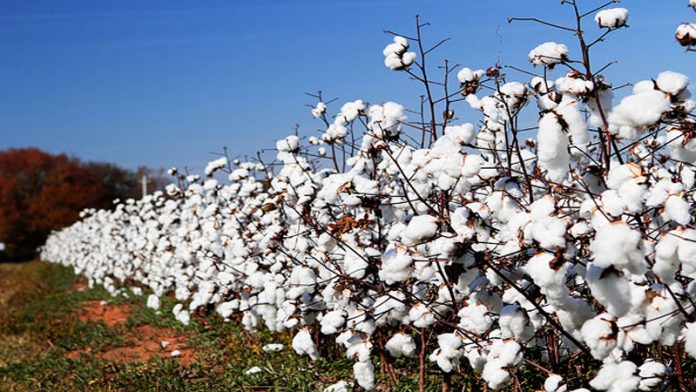ISLAMABAD: Owing to the incumbent and previous governments’ lack of interest in the agriculture sector, the production of cotton, and more importantly, the yield of cotton have dropped considerably to the levels that were seen back in 2002-03.
The highest area was 3.1 million hectares in 2001-02 that was decreased to 2.69 million hectares in the year 2017-18. This year’s target area was 2.9 million hectares; however, it was reduced by 30 per cent in the first cotton crop assessment and subsequently, the production target was revised to 10.84 million bales.
The production of cotton was recorded at 10.6 million hectares in 2001-02. Similarly, the yield was 759kg/ha in 2004-05 which also plunged down to 752kg/ha in 2017-18.
Presently, the textile sector contributes 60 per cent in exports and is entirely dependent on cotton.
Officials talking to Pakistan Today lamented that neither the incumbent government nor the previous governments gave any importance to the federal food ministry as well as the agriculture sector.
The government had been running the ministry on adhocism, as two to three charges of different sections had been given to each officer and similarly; secretaries have been found to avoid working in this ministry, officials claimed.
Tahir Mehmood Qureshi is working as the Deputy Secretary (Plan). He has been given the additional charge of Food Security. Similarly, Imtiaz Ali Gopang has been given the charge of Deputy Food Security Commissioner-II as well as the current charge of Food Security Commissioner-II.
Recently, Pakistan Muslim League Nawaz (PML-N) government had transferred the Pakistan Central Cotton Committee (PCCC) to National Food Security and Research from the Ministry of Textile on the recommendation of Senator Sartaj Aziz, who recommended that the PCCC should be transferred to the Ministry of Food Security and Research owing to many reasons including the poor performance of PCCC.
Officials in PCCC on the condition of anonymity said that PCCC is being operated on a dual charge given to some blue-eyed officers from the last six years, adding that the dual charge continued even today.
The farmers, ginners and the industry were of the view that PCCC has failed to develop the latest seed technology in recent years, which is why production has been dwindling.
If the cotton area remained to 3.1 million hectares, and yield which was 815kg/ha being the highest in 2011-12, then cotton production would have been 14.93 million bales, approximately 4 million bales more than the revised targets for the current year.
On the other hand, officials working in the ministry told Pakistan Today that the government is running the affairs of PCCC on an acting charge basis. The production area of cotton crop decreased due to climate change and other reasons, however, PCCC has developed 22 new varieties of cotton seeds in the last five years. Interestingly these seeds also could not enhance the production of cotton, however, the per unit area yield has increased in recent years, officials said.
It is pertinent to mention that cotton is the basic raw material utilised by the textiles sector for subsequent value addition. The government is providing 5 per cent exemption to the textile sector on import duty and sales tax.




